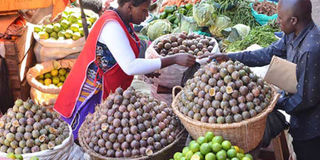Control food prices to avoid starvation

As the coronavirus freezes economic activities, Bank of Uganda has also downgraded growth projections to between 3 per cent and 4 per cent, down from an earlier forecast of 6 per cent going by Bank of Uganda latest figures. FILE PHOTO
What you need to know:
The issue: Food prices
Our view: If food prices continue soaring as a result of the lockdown, more households are likely to suffer from starvation and malnourishment as the quantity and quality of food intake reduce substantially.
As the country goes through the second phase of the lockdown, it is disturbing to see that the coronavirus pandemic has sent food prices skyrocketing.
The extension of the lockdown by another 21 days has piled pressure on some supply chains, partly explaining why neighbourhood markets and supermarkets have hiked food prices. This has been worsened by the fact that the current supply is not enough to fulfil the demands fuelled by panic buying.
Unfortunately, Uganda does not have any, price control or competition laws to protect her citizens from price hikes arising from unacceptable conduct and restrictive trade practices. Much as we operate in a liberalised economy, it is high time government thought of ways of preventing the situation from getting out of hand.
Earlier, President Museveni had warned that he would cancel licences of traders who would take advantage of the coronavirus pandemic to increase prices of food stuff and other essential goods. However, this warning seem to have fell on deaf ears. The price of basic commodities such as salt has risen to Shs1,500 up from Shs800 just before the pandemic broke out.
As the coronavirus freezes economic activities, Bank of Uganda has also downgraded growth projections to between 3 per cent and 4 per cent, down from an earlier forecast of 6 per cent going by Bank of Uganda latest figures.
This is worsened by the fact that the global economy is battling recession with a projection of contracting by 3 per cent this year as lockdowns disrupt supply chains. This is worse than the last recession, when the global economy contracted by less than 1 per cent between 2008 and 2009.
The coronavirus pandemic, which has battered Uganda’s economy, has eroded some people’s purchasing power. It has also put a strain on demand for fresh food items in preference for dry rations as people rush to stock up non-perishable foodstuffs such as rice, maize flour and dry beans. Rising prices point to a looming food security crisis.
Therefore, labour shortages, transport disruptions, limited access to markets and supply chain distortions are likely to affect steady food supply, leading to food insecurity.
If food prices continue soaring as a result of the lockdown, more households are likely to suffer from starvation and malnourishment as the quantity and quality of food intake reduce substantially.


